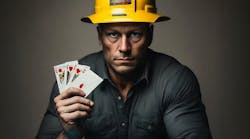The risk of using new technology to enable a reactive maintenance culture
Last January, ChatGPT and generative AI took the world by storm as the latest technologies of several poised to change manufacturing and heavy industry. To kick off the new year, Plant Services asked several expert practitioners and consultants to tackle questions on the ways that technology and market forces have shaped the M&R industry over the past 10 years.
Shon Isenhour, CMRP, is founder and owner at Eruditio, a maintenance and reliability training & consulting organization, and has been at the forefront of considering the ways that generative AI is changing the how maintenance and reliability professionals plan and execute work. In this interview, he assesses the risks associated with using new technologies to make emergency repairs rather than to drive a proactive maintenance culture.
1. How has the core skill set (and/or toolbox) of the average mechanical plant millwright changed over the past 10 years?
I'm not sure the tools specifically have changed that much, but I do think the skill set has probably decreased. As far as the tools, the mechanical equipment hasn't changed significantly so the tools have not changed all that much. While we could argue the electrical and controls has for sure, but in general the tools have not changed significantly in the last 10 years.
Now let’s talk about skills, there's been a huge loss of experience. A lot of people are understaffed or can't fill roles, so they are accepting people into their organizations that maybe are at a lower skill level than they would have in the past. They also have the loss of a lot of people as they retire out of the organizations.
Your journeyman are retiring out, which is a lot of experience leaving the industry. Then on the flip side, on the entry level, we're taking people maybe that we wouldn't have taken 10 years ago, when we had more people available to fill these roles. I'm not speaking for every part of the country, but a large portion seems to be reflecting that. Many are having to hire folks just because we need to fill the role, not because they had the perfect aptitude or they showed the right behaviors, whereas in the past, maybe they would have brought someone in from another manufacturing company that had that experience.
Operator care is becoming more and more prevalent, but I don't know that it's necessarily excelling for the exact reasons I was just talking about. One of my concerns, is we've got this lower level of skill with the retirement and the lower standards of hiring, and then we're asking them to do more technical things. To me, that's a recipe for reduced reliability. If I don't teach them that there is a difference in two types of lubricants and they mix those two lubricants together, now I've got a potential reliability issue that was born out of a lower skill level and a lack of training. In most cases, in that scenario, it's a lack of training: we've asked them to do something we didn't train them to do.
2. How has the core skill set (and/or toolbox) of the average reliability manager changed over the past 10 years?
It changes cyclically, as far as what's in favor and what people are excited about. You see things like Lean and Six Sigma, or PM optimization or FMEAs become very popular, and then they fade away, and then they become very popular again. On the bigger side, we've got a lot of new technology at our disposal that we didn't have 10 years ago, and the cost has come down on many of these technologies, so as a reliability person, the technologies may be a little more appealing than they were even a few years ago.
But, the process side hasn't changed. We know that we need to have good business processes, we know that we need to plan the work, we need to schedule the work, we need to execute the work. We know that we need to use FRACAS or failure codes in order to identify reoccurring failures and issues, and we know those need to have RCAs performed. We need to understand why they're happening, and we know that the findings of those RCAs need to be implemented and something actually done with them. And if at any point in this end-to-end process, we don't do one of those steps, all the technology and tools in the world is not going to add value it could.
One thing I'm starting to notice is that a lot of people are doing potentially the right things for the wrong reasons, and using new technology to enable their reactive maintenance culture. They'll go out and they'll buy predictive maintenance technologies, not in order to enable their planning and scheduling process and reduce their maintenance costs and improve their reliability, but more-so because they want to be able to identify problems and do emergency repairs on those problems. So they're not using the technology where it adds the most value.
3. What kinds of Industry 4.0 technologies do you consider to be table stakes for current maintenance and/or reliability professionals?
I think robots and automation, you pretty much have to do that now, especially because we can't hire enough people with the right skills. That's becoming more and more prevalent if you consider that part of Industry 4.0, which I do.
I think 5G has become more important, because now it's a way to get information and data out of the system, even if I can't get it through the traditional IT route. 5G also is becoming more and more critical to separate the internal network from the data that you don't necessarily need on the internal network. Especially with a lot of hacking and similar attacks recently, people aren't nearly as interested in putting more things on their internal networks.
Having more information and being able to run analytics on it is going to continue to be a game changer as we go forward. I'm not suggesting that everybody's doing it right, and I'm not suggesting everyone is using their data. I've been into a couple of automotive clients and others where they had tons and tons of data, but it wasn't really being converted into much information. I think as more and more organizations figure out how to interface with that data, whether it's AI or analytics, or whatever they choose to use, I think having the data is going to become more and more important.
4. Which industry verticals, if any, tend to be quick to embrace newer technologies like IoT or AI? (this can include public utilities)
This was a fun question to think about, because when I think about who is progressive in certain areas, if we talk about AR and VR, as an example, which arguably is part of Industry 4.0, as well, that has been embraced more so by aerospace. That doesn't mean that they have the other parts of Industry 4.0, although they have many. Also, if you want to talk about robotics, automotive has always been very progressive in the use of robotics. You go into one of their plants, and very quickly you see a robot count that’s much higher than what you would see in most facilities.
As I think about who truly embraced Industry 4.0 early it is power generation. That sector has had connected sensors embedded all over their units for more than 20 years, it's not new for them at all. I can think back to working in a power plant, helping them implement reliability in probably the late 2000s, and they were already fully instrumented and connected. You knew what was going on in every part of that facility, and I don't know that we would say the analytics were as good as they are today – they were still doing rudimentary analytics – I'd have to say that power generation was an early adopter of the technologies, and they've just carried on and used it more and more.
5. When new condition monitoring or asset management technologies are introduced, which members of the team are the ones driving these projects? Does it make a difference if the new technology is hardware or software?
I don't know that I can put a certain title on it because most of the time it's the individual who adopted it most early and talks about it most often – almost the prophet of that technology, if you will. If I got really excited about ultrasound, I might talk about that everywhere, and then I'll end up leading that going forward. If I get really excited about big data, and I know many folks who do, then they kind of spill that excitement throughout the organization. It could be any role, but it's really, who has the passion to figure out how to convey it to the organization such that the organization begins to see the value.
6. In your opinion, what are one or two things that would make an impact in alleviating the hiring challenges currently associated with the M&R job market?
First is the planning of work with precision maintenance techniques included. If I know that we are going to do a job multiple times this year, then taking the time to plan that job effectively, taking the time to break it down into both a checklist and a step description for each of those elements is key. If I'm new here, I can learn from the job plan. If I'm an experienced individual, I can grab the little morsels from the checklist that I need in order to do it correctly.
My second point on this question is AI with human interaction. My experience is that AI produces a job plan that is somewhere between 30 and 60% accurate, and it's easier to edit a job plan than it is to create it from scratch. If AI helps me edit or create job plans, and I edit them, and instead of only 2-5% of the organizations planning, I can get 50% of the organizations out there beginning to plan, then that's going to allow them to be more efficient, and more effective. Also they're going to have less reoccurring downtime and reoccurring failures, therefore needing less people to do the same work, which helps them with their hiring issues.
Also, if I train somebody and they leave, I lose everything. If I train somebody and I build a really good procedure or job plan at the same time to do that work, even if I lose them, I don't lose the procedure. It's there in the CMMS, it's in the job plan library, it can continue to be used over and over providing value even after the people are gone.


